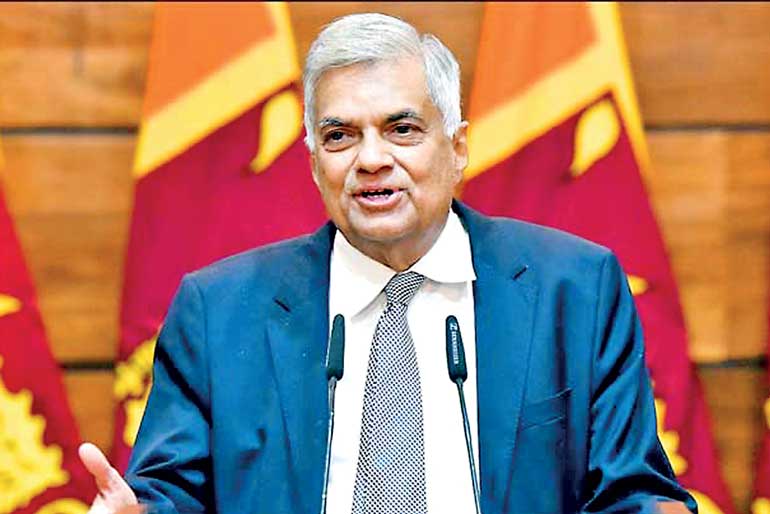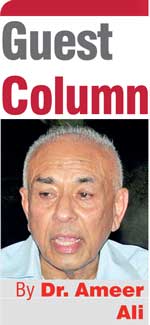Friday Feb 13, 2026
Friday Feb 13, 2026
Tuesday, 29 November 2022 02:36 - - {{hitsCtrl.values.hits}}

President Ranil Wickremesinghe

President Ranil Wickremesinghe’s flight to Egypt and participation at the COP27 Sharm El-Sheikh climate conference, which ended with eleventh-hour agreement to create a Loss and Damage Fund (LDF) to compensate developing countries for damages suffered from climate change, was a journey to look for more financial assistance to a beleaguered economy. The trip appears to be a shrewdly planned mission to use an opportunity provided by that conference to kill two birds with one stone i.e., to arrest Sri Lanka’s historic neglect of its environment and reduce the burden of national debt via DFNS (debt for nature swap).
Although the reduction of $ 1 billion is not going to make much of a difference to the staggering total of $ 51 billion national debt, yet it is better than nothing.
Whether LDF would materialise at all is also doubtful in view of an earlier failure by rich countries to fulfil their commitment at the 2015 Paris Conference to raise $ 100 billion for the same purpose. Be that as it may, one of the reasons why RW is in a hurry to utilise DFNS to reduce debt, even if it involves only $ 1 billion, is to send a subtle message to IMF that its insistence on debt restructuring as condition for receiving the provisionally agreed $ 2.9 billion assistance is unfair and unworkable. RW and his CBSL Governor worked on the assumption that that money would become available by December this year. Now it appears that they have to wait at least until March next year if not longer.
An agreement on debt restructuring, in spite of published optimism, appears to have hit the rocks with China, the largest creditor holding more than 50% of the non-Paris Club debt and is dragging its feet to come to the negotiating table. While China is prepared to give extension of time to settle the debt, ready to lend even more if asked and even willing to negotiate for a free trade agreement with Sri Lanka, debt restructuring to please the IMF is outside its agenda. Meanwhile, the other non-Paris Club creditor, India, and a Paris Club member, Japan, have adopted a wait and see approach until China makes its move. One needs no reminder of the fact that it was Sri Lanka’s inability to settle an earlier debt, which forced the Government to cede the Hambantota harbour to China on a 99-year lease. Is the Dragon now eying on another real asset?
It is in this context that RW has opted for a $ 1 billion worth DFNS and started negotiating with UNDP and other agencies. He is also reported to have directed his officials to begin the process of identifying projects that could be considered for DFNS.
DFNS is the purchase of a developing country’s debt at discounted value in the secondary debt market and cancelling that debt in return for environment related action undertaken by the debtor nation. Through this mechanism one may expect the country’s environmental damage to slow down if not halted completely, provided the right project is identified, designed and efficiently executed, while national debt would be reduced at the same time by $ 1 billion. If the plan works out RW could earn another feather on his cap. The World Bank’s interest in exploring Sri Lanka’s offshore wind potential to create renewable energy is another encouraging move that may help RW’s political aspirations.
However, IMF doesn’t seem to be happy at D4NS, because it feels that RW is sidetracking attention on debt restructuring. After all, the IMF, while acting as a lender of last resort to economies fraught with Balance of Payment difficulties, is also a debt collector for members of the Paris Club. Thus, there is a hidden agenda in IMF’s assistance. In the final analysis, China’s foot dragging and IMF’s nagging on debt restructuring reveal the geo-political complications behind Sri Lanka’s efforts to revive the economy.
Given this impasse the chances of realising RW’s 2023 Budget aspirations appear to be slimmer than what appeared initially. In a sense, the controversy and indecision among members of parliament before the second reading of the budget was partly a reflection of the IMF-China tussle over debt restructuring.
That there is an active and vociferous China lobby inside and outside the parliament is an open secret. (That lobby is also imbued with Indophobia, which worked effectively to prevent Colombo Harbour East Container Terminal falling into the hands of India’s Adani Group, and is again showing its ugly head to prevent privatised Telecom sold to the same group). Unlike the IMF, which insists on taking effective measures to eradicate nepotism and corruption, and about which RW seems to be lackadaisical in the interest of his own political survival, China does not insist on any domestic reform as pre-condition for inter-governmental financial assistance. This is an absolute bonanza to the corrupt and criminal elements that are waiting to capture power again.
Weren’t those elements the ones that drove the country to bankruptcy in the first place? Unfortunately, RW needs their support to remain in power, at least until he prepares the ground to re-build his own party to challenge this group at the next election. While the pro-China lobby would welcome more of Chinese aid in preference to IMF’s, China’s geo-political adversaries would wish to keep the Dragon at bay by using IMF’s financial bait and other pressures as instruments of subtle coercion.
In between IMF and China are the masses who want immediate relief from their economic pain. Scarcities of essentials with ever-increasing prices, falling income and unemployment have driven millions to the brink of starvation if not death. RW is preaching patience and demands attitudinal change to face unpleasant realities. But hunger is leading to crimes and other social evils.
Being a committed neo-liberalist, RW is hoping to create a competitive economy driven by private enterprise burdened with higher taxes and less subsidies. On that count he is also ready to privatise all SOEs in the name of restructuring and without making any effort to cleanse them of corruption and nepotism. In fact, it is these two evils more than anything else that have sapped the profitability and efficiency of SOEs. Privatisation is not a panacea for inefficiency. It is a mistake to think that competitiveness and efficiency are the monopoly of private enterprise. That is a calculated myth propagated by free marketers. Are all profit-making enterprises in China private?
Finally, to protect himself and his growing autocracy, RW has instructed the police to take stern action against protestors. Police brutality against women protestors and tear-gassing undergraduate demonstrators are, if anything, symptoms of Aragalaya resurgence. The coming rainy months are going to be testing time not only for the President but also for the entire country.
(The writer is attached to Murdoch Business School, Murdoch University, Western Australia.)